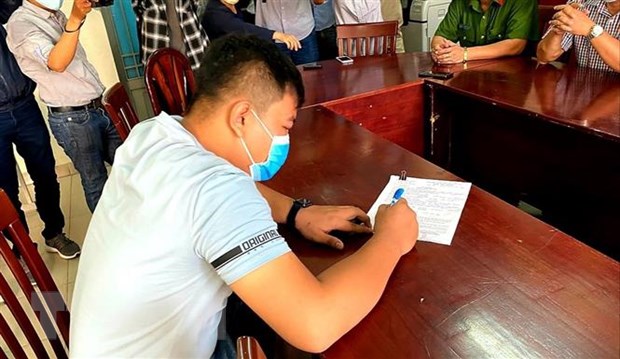 Politics & Law
Politics & Law


|
| A man is fined VNĐ10 million ($418) for spreading fake news in Thừa Thiên Huế Province. —VNA/VNS Photo Thành Chung |
HÀ NỘI — A range of new policies will come into effect this month, including fines of up to VNĐ100 million (US$4,192) for business owners who fail to pay their employees.
The highest penalties will be reserved for enterprises owned by organisations, which fail to pay more than 300 of their staff.
The new fines were part of Decree No 28/2020/NĐ-CP, issued by the Government on March 1, regarding administrative sanctions for violations in the field of labour and social insurance.
The decree is set to come into effect on April 15.
For individual business owners, the decree sets out fines of VNĐ5-10 million ($209-418) if failing to pay the salary for 1-10 workers; VNĐ10-20 million ($418-836) for failing to pay 11-50 workers; VNĐ20-30 million ($836-1,250) for failing to pay 51 to 100 workers; VNĐ30-40 million ($1,250-1,680) for failing to pay 101 to 300 workers; and fines of VNĐ40-50 million ($1,680-2,097) for failing to pay the salary of more than 300 workers.
The fine will be doubled if an organisation runs an enterprise.
Following the 2014 Việt Nam enterprise law, every organisation and individual is entitled to establish and manage enterprises in Việt Nam.
Also, from April 15, Decree No 15/2020/NĐ-CP, issued by the Government on February 3, will come into effect. The decree says that a person found spreading fake news on social media sites will be fined VNĐ10-20 million ($418-836).
The decree will replace the old decree No 174/2013/NĐ-CP, issued in 2013 by the Government.
Also, this month, Circular No 28/2019/TT-NHNN, issued by the State Bank of Việt Nam, will take effect as of April 1.
The circular states that a person over 15 years old, who has not lost or limited their civil act capacity, can use a secondary credit card, debit card, prepaid card (supplementary cards) without requiring the written consent of their legal representative as before.— VNS




